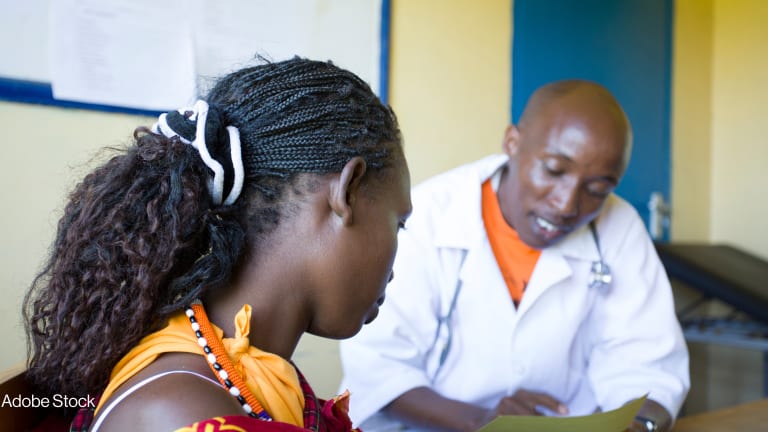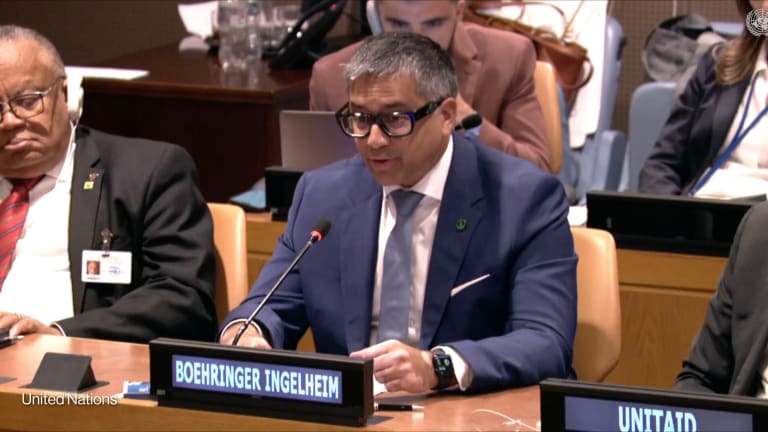Investing in kidney disease can help save lives, money, and the planet

Chronic kidney disease, or CKD, affects more than one in 10 people globally — 840 million individuals. And an increasing proportion of people living with this hugely underdiagnosed and progressive illness are in low- and middle-income countries where dialysis is often inaccessible or prohibitively costly and organ transplant is sometimes completely out of reach.
Kidney disease is already the greatest cause of catastrophic health expenditure in LMICs, and such costs will likely increase as case numbers continue to rise.
But while five million people die every year due to lack of treatment — and CKD is projected to become the world’s fifth leading cause of death by 2040 — it remains underprioritized compared to other noncommunicable diseases such as hypertension or diabetes.
On the occasion of the 78th session of the United Nations General Assembly in New York, Devex and AstraZeneca hosted the event How improving kidney health can transform health systems for all to explore how more investments into CKD prevention, detection, and treatment can improve outcomes for patients and reduce its burden on LMICs.
Attendees at the event agreed that investing in CKD prevention, screening, and early treatment, as well as health worker training, awareness raising, and improved data, would bring significant social, environmental, and economic benefits.
“Let’s keep patients healthy and let’s keep the planet healthy by raising chronic kidney disease high up the rankings of NCDs,” said Joris Silon, U.S. country president of AstraZeneca’s biopharmaceuticals business unit.
Katie Dain, CEO of the NCD Alliance, described CKD as “part of the family of NCDs” but said it is all-too-often overlooked. “CKD is intimately connected to so many NCDs … why isn’t it part of the big four or five that the WHO is focused on? CKD can really be a pathfinder for the broader NCD response that needs to happen within health systems — and that [requires] shifting to a primary health care approach,” she said.
Here are five key takeaways from the event.
1. Make the environmental and economic case for prioritizing CKD
There is a strong environmental argument for prioritizing early interventions for CKD, explained Silon, adding that dialysis consumes 169 billion liters of water every year and generates one billion kilograms of medical waste.
Increasing temperatures driven by climate change also impact the prevalence and incidence of kidney disease, “so it’s very bidirectional,” noted Dr. Adeera Levin, professor of medicine and consultant nephrologist at the University of British Columbia and former president of the International Society of Nephrology.

Raising awareness among policymakers about the benefits of investing in CKD is essential, argued Marisol Robles, president of the Mario Robles Ossio Foundation and herself the recipient of a kidney transplant. With the cost of treating a CKD patient reaching as high as $100,000 per year, “doing things now could save money later on and save lives,” she argued. Robles flagged the launch this month of the Global Patient Alliance for Kidney Health, which aims to elevate patient voices and advocate for policies that improve access to screening and early treatment.
CKD disproportionately impacts LMICs and this is “affecting their growth,” said Professor Alistair McGuire, head of department and chair of health economics at the Department of Health Policy at the London School of Economics and Political Science. He noted that one-third of all cases globally now occur in China and India alone. CKD also affects more young people of working age in LMICS, meaning investments could directly support the economy, added Levin.
NCDs in general require “adequate, predictable, sustainable financing”, added Dain. Countries such as Barbados need more funding and private-sector support for interventions such as patient follow-ups, school meal programs, and community education and outreach, which would help improve prevention and early diagnosis of CKD, argued Dr. Sonia Browne, Minister of State in the country’s Ministry of Health and Wellness.
The country’s Queen Elizabeth Hospital already spends 65% of its budget on NCDs. And although Barbados has a national health insurance scheme open to every contributing Barbadian, the number of years of CKD treatment it covers is restricted, and some patients have had their dialysis sessions reduced from three per week to two, she noted.
As part of its Global Action Plan for the Prevention and Control of NCDs 2013-2030, WHO has developed a menu of policy options for governments that include cost-effective interventions for preventing and managing CKD, noted Dr. Slim Slama, the unit head for NCD management at the World Health Organization. To ensure people benefit from such interventions, they should also be prioritized in governments’ financial benefit packages, he added.
2. Focus more on primary care prevention and early detection
Delaying the diagnosis of stage three CKD by just one year can accelerate the progression of the disease by as much as 40% and increase the risk of a patient later needing a transplant or dialysis by 60%, stated McGuire.
Health care systems should therefore shift their focus from late-stage “tip of the pyramid” replacement therapies such as dialysis toward “base of the pyramid” prevention and early detection at the primary care level, added Slama.
Countries need support to offer simple blood and urine tests as part of more targeted screening for CKD, primarily among higher-risk populations with diabetes or hypertension, he added.
With so many health systems still focused on acute care, there’s a need to pivot toward primary prevention and chronic care, agreed Dain, noting that health promotion and prevention are often forgotten in conversations around universal health coverage or pandemic preparedness.
3. Coordinate an integrated response
Improved CKD care requires more integration and coordination — both at the individual health system level and in how the global community sets health priorities and supports LMICs, event participants argued.
“We really need to figure out how to coordinate, how to integrate, how to work together to be able to provide high-quality care at the front lines where patients first interface with us and to be able to better coordinate all the way up to the tertiary level of care we need to provide,” stressed Dr. Jeff Markuns, regional president for North America at the World Organization of Family Doctors.
The strong relationship between CKD and other NCDs — with kidney disease being both a cause and a consequence of cardiovascular disease, for example — creates an opportunity for more joined-up screening and treatment, argued Levin.
“I would almost see kidney disease as the canary in the coal mine,” she said. “If you can find people with a little bit of protein in their urine, you might actually see what other conditions they have.”
4. Invest in human resources for CKD
A severe shortage of appropriately trained health workers in many LMICs must be addressed to improve diagnosis and care for people living with CKD and related conditions, panelists argued. More training and investment are needed in Barbados, for example, where there are only around three kidney doctors for the 293,000-strong population — over 13% of whom live with CKD — noted Browne.
Markuns also flagged that the health worker shortage on the African continent is set to reach 6 million in 2030, and not enough is being done to plug this gap. He called for investment to create a strong workforce of competent primary health care providers who can manage complex conditions like CKD.
More health care professionals must be trained to detect, manage, and treat CKD and other NCDs effectively and holistically, added Dain. “We’re not here just talking about nephrologists. We’re talking about diabetologists, we’re talking about community health workers. It’s taking the whole human resources for health and health worker approach to make sure that CKD and NCDs are integrated,” she said.
5. Invest in improved data systems for CKD
Having better metrics to monitor the performance of CKD interventions could help identify and demonstrate where investment is most needed, and facilitate more coordinated and effective care, argued Markuns. Repositories of data such as the ISN-Global Kidney Health Atlas — which reports on everything from CKD prevalence to nephrologist availability by country — can support decision-making around kidney care, agreed Slama.
McGuire also made a call for better data to highlight and increase awareness about CKD and NCDs generally, which he argued could “help move the dial toward earlier treatments and earlier interventions.”
Watch the full event here to learn more.
Search for articles
Most Read
- 1
- 2
- 3
- 4
- 5








